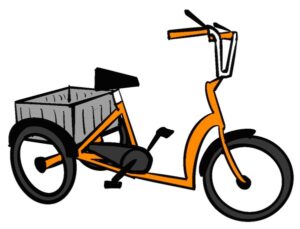The World Health Organisation officially recognises tricycles as mobility aids and lists them amongst the mobility equipment that Disabled people might use. Wheels for Wellbeing are campaigning for this approach to be implemented across the UK for all cycle types, so that Disabled people are not prevented from using their cycle as their mobility aid.
In this episode of our My Cycle My Mobility Aid blog and podcast, we talk to Alistair about his tricycling experience.
Alistair with baby and getting ready to go for a ride.
Alistair is 26 and got into cycling as an adult: He didn’t have the chance to learn as a child since his dyspraxia meant he couldn’t – and can’t – ride a 2-wheeled bike. While he enjoys the fun, independence, social opportunities and exercise cycling brings, he also has to deal with a range of different barriers which limit how he can get around using his tricycle.
The biggest barrier is infrastructure and the lack of safe, accessible cycle paths.
“So my commute, I have to make a choice between either cycling on the pavement which in the West Midlands, we’re allowed to as a Disabled person, or to go on a very fast road. But if I go on the pavement, I’ll get shouted at occasionally by people, if I go on the road, there’s much more chance of being hit because I’m a wider vehicle. And then I then hit canal pathways, so I have to carry my tricycle down two sets of stairs. Now for me, I’m relatively young, and I just about trust my balance in good weather to be able to do that. As I get older, that probably won’t be the case.”
Alastair also spoke about the attention he receives as a Disabled cyclist.
“This bloke came up to me and said ‘Oh, you, are you an invalid, then?’… he was like ‘you maybe should have a little flag on the back of your cycle’, and I was like ‘oh dear…’”.
Using public transport can be difficult:
“[Going on the train for work] I was crammed into the storage space for a cycle. The conductor said the only way to actually travel with [my trike] is you have to sit on the back of the tricycle. So I wasn’t allowed a seat. I couldn’t get any refreshments because they would only stop where there was a seat. And so, for a four-hour journey, I was in a luggage compartment…”
But there are some examples where access for Alistair and his trike is good already, or is improving:
“So for example, there’s a lift on the canal system in Birmingham, in the middle of town. And it’s great, because I just take my tricycle into that lift and go down, and I’m on the canal.”
“National Express buses seem to be really positive about getting space for tricycles and other Disabled cycles onto buses. So I think in there are examples where things are changing.”
Alistair has loads of ideas around how to improve cycling, especially for other tricycle users, from infrastructure improvements to access to public transport:

“It’d be about segregated mobility lanes for everyone, that I could use that are wide enough for my tricycle, that go to suburban areas, that aren’t just in inner city areas.”
“And having that multimodal access between bike, buses, trains, etc: As someone who can’t drive, and who often relies on my wife to drive, I don’t want to be saying, can you take me here, there and everywhere – because that’s not filling me with confidence. That’s not something that is upskilling. It’s about actually can I be supported to get on public transport wherever I want to get to. So that would be it.”
Finally, Alastair has a positive vision for the future, where Disabled and non-Disabled people alike can access the cycles that suit them best, without facing barriers, stigmas or prejudice:
“Once more people start using tricycles and they aren’t just seen as either an oddity or just something that a Disabled person has: When they’re more of an option for people who maybe just have limited mobility or people who haven’t ever ridden a bike and think that a tricycle is a good way in, then we’ll start more ways that things can be better. A bit like my wife’s got coeliac disease. And once everyone started on gluten free diets now there’s gluten free stuff everywhere. So once everyone just sees cycles like tricycles as ones they can use, not just limited to Disabled people or people who are Dutch, then then I think it’s going to be better.”
You can listen to the full chat with Alistair on our My Cycle My Mobility Aid podcast channel and download the transcript– and look out for the continuing fortnightly series of My Cycle My Mobility Aid podcasts, blogs and campaigning resources. If you would like more information or to share your story for our campaign please contact Kate@wheelsforwellbeing.org.uk.
